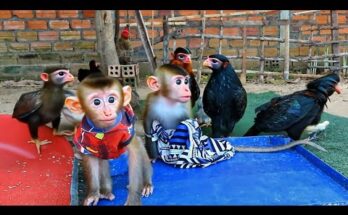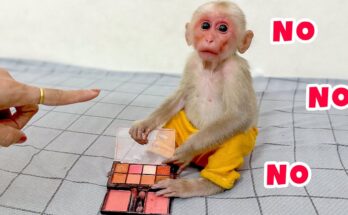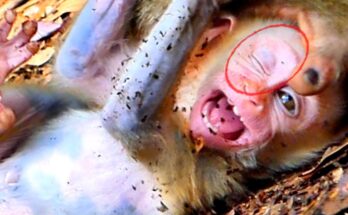
Life in the wild is often unpredictable, and the bond between mother and child can mean the difference between survival and tragedy. For Luna, a young mother lynx, caring for her newborn is both a privilege and a challenge. Yet, in moments of inexperience and distraction, her careless behavior becomes worryingly clear — leaving her fragile baby vulnerable in a world filled with hidden dangers.
The story begins with Luna moving her tiny cub to a new resting place. The baby, small and helpless, mewled softly, its eyes barely open, its body weak and dependent. Instead of handling the cub with gentleness, Luna dropped it roughly onto the forest floor before turning away to groom herself. The cub squirmed, crying out for warmth and comfort, but Luna seemed distracted, pacing and restless as if the responsibility of motherhood weighed too heavily on her.
Observers could not help but feel their hearts ache. The little lynx, so fragile and defenseless, deserved the tender protection of its mother. Yet Luna often wandered away, leaving the cub alone for long stretches of time. The forest is no safe place for a baby — predators lurk, the weather shifts quickly, and without warmth, the tiny creature could not survive for long. Each time Luna left her cub unattended, she was gambling with its life.
But perhaps Luna’s carelessness is not rooted in cruelty. She is young and inexperienced, still learning the instincts that guide seasoned mothers. While some lynxes take naturally to nurturing, others falter, making mistakes along the way. For Luna, motherhood seems more like a burden than a joy, and her constant distraction reflects her uncertainty. She sometimes even pushes her cub aside while searching for food, as though forgetting its desperate need for her attention.
The sight of the helpless baby lynx struggling alone in the grass is both heartbreaking and frustrating. Its small cries pierce the silence, calling out for a mother who doesn’t always come quickly enough. And when Luna finally returns, she often shifts the cub roughly or neglects to feed it properly, leaving onlookers torn between anger and sympathy.
Still, hope remains. Nature has a way of teaching, and instincts can grow stronger with time. Perhaps Luna will learn that her cub’s survival depends on her focus and dedication. Perhaps she will transform from careless to cautious, from distant to protective. For now, though, her role as a mother is shaky, and her cub’s future hangs in a fragile balance.
The story of Luna is a reminder that not all mothers are perfect, whether human or animal. Some struggle, some make mistakes, and some need time to grow into their role. Watching Luna with her cub is both painful and powerful — a glimpse into the raw truth of life in the wild, where survival depends not on perfection, but on learning, adapting, and ultimately, love.


